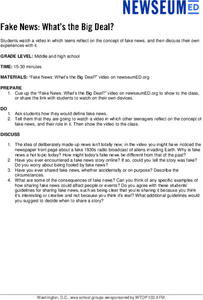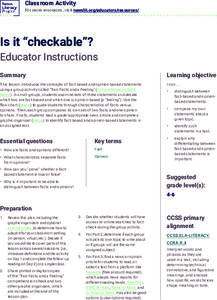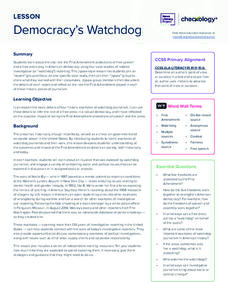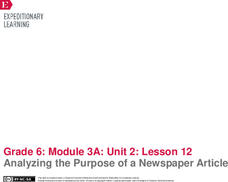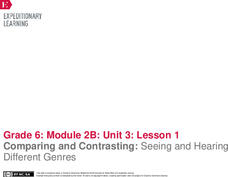Newseum
When the News Media Make Mistakes
Mistakes happen. When they happen in news reporting, be it in print or on the internet, journalism ethics requires that the errors be corrected. Young journalists use an Accuracy Checklist to track how news organizations post corrections...
Newseum
Fake News — What's the Big Deal?
In a time of fake news and alternative facts, young people must have the ability to identify it and its role. Scholars watch a video of teens reflecting on the concept of fake news and the impact of sharing fake news stories. They then...
News Literacy Project
News Goggles: Quotes in News Reports
To quote or paraphrase? That is the question examined by a 29-slide presentation on the importance of including direct quotes in news reporting.
News Literacy Project
News Goggles: Conflicts of Interest in News Reports
Nineteen slides use the story of Chris Cuomo of CNN and his refusal to discuss his brother, New York governor Andrew's political troubles, to inform viewers about the idea of conflict of interest in journalism.
News Literacy Project
News Goggles: Tracking Developing Stories
A 28-slide presentation introduces viewers to the process reports go through to track and verify developing news stories. Using the reports of the attacks at Atlanta, Georgia, massage parlors as an example, viewers are taught what to...
News Literacy Project
News Goggles: Ad or News?
Ever seen the labels "sponsored content," "native advertising," "advertorial," "paid post," "#ad," or "#sponsored?" If so, then you are looking at advertisements that are designed to appear as news stories. Learn how to tell the...
News Literacy Project
Is It “Checkable”?
Upper elementary scholars test their checking skills with a lesson that challenges them to distinguish between fact and opinion. First, the class takes part in a discussion regarding a helpful flow chart. Next, learners follow the flow...
News Literacy Project
Democracy’s Watchdog
As part of a study of the importance of the First Amendment, expert groups research different historic case studies of investigative reporting, and then the experts share their findings with jigsaw groups. The case studies include Nellie...
News Literacy Project
News Goggles: Covering a Newsworthy Trial
The trial of Derek Chauvin, former Minneapolis police officer charged in the death of George Floyd, is the focus of a lesson that asks pupils to compare how local, nationial, and international news organizations reported the testimony of...
DocsTeach
WWI Propaganda and Art
Uncle Sam wants you! During World War II, the US government and military created a propaganda campaign to gain public support. The activity uses primary documents such as photos to explain how and why the propaganda campaign was...
Academy of American Poets
Poems about Poetry
Learners of all ages hear the words “Today we’re going to start poetry” and begin their plans to drop out of school. It is not the teacher's fault! Use this resource to help young scholars understand the genre of poetry and why it is...
Angel Island Immigration Station Foundation
Culminating Writing Project - Reporting on Angel Island
The unit study of Angel Island Immigration Station concludes with scholars using information from the previous lessons to craft a news story about the Angel Island program.
EngageNY
End of Unit 3 Assessment: Drafting the Newspaper Article
Choose your words carefully. Scholars continue looking at the creation of a newspaper article by examining word choice. They highlight key verbs, vocabulary, and descriptive words in the model article Sandy wreaks havoc...
EngageNY
Performance Task: Final Draft of the Newspaper Article
It's time for the grand finale! Scholars complete the final draft of their newspaper articles for the End of Unit 3 Assessment. They share their article with a classmate for peer critique. After considering all feedback and including a...
EngageNY
Revising the Newspaper Article: Sentence Structure and Transitions
Take two. After a mini lesson covering sentence structure and transition words, scholars revise their End of Unit 3 Assessment based on feedback. Writers self-score their assessments against row three in the Newspaper Article Rubric.
EngageNY
Organizing Research: The Inverted Pyramid
Bottom side up! Scholars complete an Inverted Pyramid handout to gain a better idea of how journalists organize information. They then look at the organization of a model newspaper article and gain ideas about creating their own...
EngageNY
Analyzing the Features of a Newspaper Article
There's more to newspaper articles than meets the eye. Scholars learn the different features of a newspaper article, including headline, byline, subheadings, etc. Pupils circle the features in an article as the teacher discusses their...
EngageNY
Researching Facts
How did the 1906 San Francisco earthquake and fire affect the city's inhabitants? Scholars embark on a quest to discover the answer as they work in small groups to research articles about the event. They finish by completing a jigsaw...
EngageNY
Analyzing the Purpose of a Newspaper Article
Shh! No talking during the discussion! Using the resource, scholars engage in a silent discussion called a Chalk Talk activity to analyze the purpose of a newspaper article. Additionally, they read a model newspaper article and try to...
EngageNY
Comparing and Contrasting: Seeing and Hearing Different Genres
Let's compare and contrast! Scholars use a Venn diagram to compare and contrast the experience of reading a poem and listening to its audio version. Next, they complete graphic organizers, comparing two different genres: a poem and a...
News Literacy Project
Story Explorers: Evaluate News Coverage
What makes an issue or event newsworthy? Scholars complete a K-W-H-L chart based on a recent news event. As they complete the chart, small groups collaborate to analyze coverage of the story or event.
Committee for Children
Students Learn to Stop Rumors Before They Start
Two activities look at how rumors are spread and ways class members can stop them. The first activity brings forth an in-depth conversation about how reporters gather information to write articles and how students can implement the same...
Teaching Tolerance
Community Newsletter
What does it take to develop and publish a newsletter? Young academics create a newsletter with original artwork for their school or community. They explore social justice themes and spread messages of tolerance and inclusion. Scholars...
Teachers Network
Witness for the Prosecution: Online Newspaper
Agatha Christie's Witness for the Prosecution becomes the text for an online newspaper activity. Young journalists craft news, features, obituary, and opinion articles based on the characters and events in the play.



